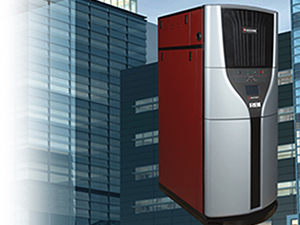
With hydronics experience dating back to 1971, we frequently encounter people using condensing boilers in non-condensing applications. Why?
In Chicago and other locations with cold winters, non-condensing boilers work well when it’s cold out and system temperatures are maintained at 160 to 180° F but are much less efficient when it’s warmer, from spring through fall, due to excessive cycling.
Condensing boilers can operate up to 99% energy efficiency because they reclaim heat from flue gases. Non-condensing boilers can only get up to 88% efficiency and do not reclaim this heat. However, to be more efficient, condensing boilers require water returning at 130° F or less. If the water is hotter, condensing becomes much less efficient. In winter, a building’s water temperature can be as high as 180° F.
Since no one type of boiler is energy efficient year-round, what do you do? Most choose condensing boilers since they are more efficient for the better part of the year but they leave building owners with high energy costs in winter. Hybrid boiler systems offer a better way.
Hybrid Boiler Systems
Not to be confused with hybrid boilers, which are technologically sophisticated but seldom used, hybrid boiler systems feature one or more condensing boilers and at least one non-condensing boiler. Energy efficiency is maximized year-round because the condensing boiler(s) is running continuously except when the return water temperature is above 135° F, at which point the non-condensing boiler automatically kicks on, turning off again when it gets warmer and the return water temperature decreases to 130° F or below.
True heat pump systems and snow melt systems are the exception: non-condensing boilers are the best fit because the water consistently returns lower than 130° F.
Support for Increased System Complexity
While hybrid boiler systems increase complexity, the Maddock team of hydronics experts is here to support you by phone or in person so you can take full advantage of the benefits, without the headache. Though condensing boilers typically cost a bit more than non-condensing, they will pay for themselves over time. We can also help ensure that you don’t end up with more than you need as the result of over-designing.
